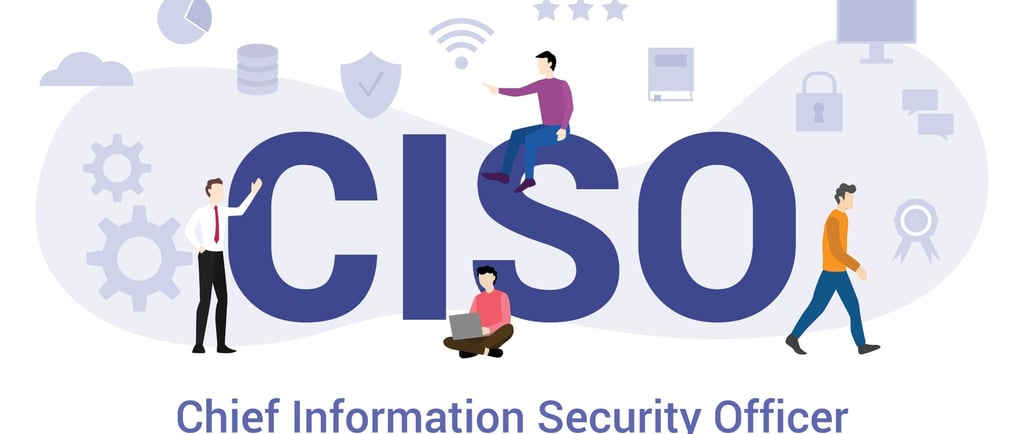
Chief Information Security Officer (CISO) – Head honcho of cybersecurity.
CYBERSECURITYCERTIFICATION


Introduction
In today's digital age, cybersecurity has become a critical concern for organizations of all sizes. With the increasing number of cyber threats and the potential for devastating data breaches, companies are realizing the importance of having a dedicated professional to oversee their information security efforts. This is where the Chief Information Security Officer (CISO) comes into play.
Role and Responsibilities
The CISO is the head honcho of cybersecurity within an organization. Their primary role is to develop and implement strategies to protect the company's information assets from unauthorized access, disclosure, alteration, and destruction. They are responsible for ensuring the confidentiality, integrity, and availability of the organization's data.
Some of the key responsibilities of a CISO include:
Developing and implementing an information security program that aligns with the organization's goals and objectives.
Identifying and assessing potential security risks and vulnerabilities.
Creating and enforcing security policies and procedures.
Overseeing the implementation of security controls and technologies.
Conducting regular security audits and assessments.
Managing security incidents and responding to breaches.
Providing security awareness training to employees.
Collaborating with other departments to ensure a holistic approach to cybersecurity.
Staying up-to-date with the latest security threats and trends.
Skills and Qualifications
To be an effective CISO, one must possess a unique set of skills and qualifications. Some of the essential skills for a CISO include:
Strong technical knowledge of information security principles and best practices.
Excellent problem-solving and analytical skills.
Effective communication and leadership abilities.
Ability to think strategically and understand the business implications of security decisions.
Knowledge of relevant laws, regulations, and industry standards.
Experience in managing security incidents and conducting investigations.
Ability to build and maintain relationships with stakeholders.
Continuous learning and adaptability to keep up with evolving threats.
In terms of qualifications, a CISO typically has a bachelor's or master's degree in computer science, information systems, or a related field. Professional certifications such as Certified Information Systems Security Professional (CISSP) or Certified Information Security Manager (CISM) are highly desirable and demonstrate a commitment to the field.
Challenges and Opportunities
Being a CISO is not an easy job. They face numerous challenges in their quest to protect their organization's information assets. Some of the common challenges include:
Keeping up with the rapidly evolving threat landscape.
Securing an increasingly complex IT infrastructure.
Balancing security with usability and productivity.
Managing limited resources and budget constraints.
Dealing with insider threats and employee negligence.
Ensuring compliance with regulatory requirements.
However, with these challenges also come opportunities. A skilled CISO can turn these challenges into opportunities to enhance the organization's security posture. By staying ahead of the curve, leveraging new technologies, and fostering a culture of security awareness, a CISO can make a significant impact on the overall cybersecurity of the organization.
The Future of the CISO Role
As the cybersecurity landscape continues to evolve, the role of the CISO is becoming even more critical. With the increasing frequency and sophistication of cyber attacks, organizations are realizing the need for a dedicated executive who can lead their cybersecurity efforts.
In the future, we can expect the CISO role to expand and evolve. CISOs will need to stay abreast of emerging technologies such as artificial intelligence, machine learning, and blockchain, and understand how they can be leveraged to strengthen security. They will also need to collaborate closely with other C-suite executives to ensure that cybersecurity is integrated into the organization's overall strategy.
Furthermore, the demand for skilled CISOs is expected to rise in the coming years. As organizations recognize the importance of cybersecurity, they will invest more in hiring top talent to fill this crucial role. This presents an excellent opportunity for aspiring cybersecurity professionals to pursue a career as a CISO.
Conclusion
The Chief Information Security Officer (CISO) plays a vital role in protecting an organization's information assets from cyber threats. With their expertise and leadership, they are responsible for developing and implementing strategies to safeguard sensitive data and ensure the overall security of the organization. As the cybersecurity landscape continues to evolve, the role of the CISO will become even more critical, presenting exciting opportunities for those interested in pursuing a career in cybersecurity.
